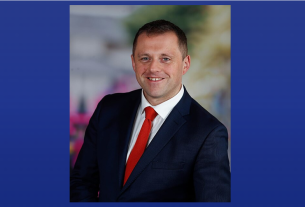Michalis Genitsariotis, a former salesman turned olive grower from the northern Greek region of Halkidiki, is constantly learning in his “second life” as a farmer.
Unlike many people with a traditional farming background, Michalis only turned to agriculture in the aftermath of the 2008 financial crisis, at a time when many were pushed to change their lives.
Seeking stability, he chose olives – a highly valued crop and a staple of the region.
“I wanted something that we know how to grow in Greece, but I wanted to do it better,” he said. His goal is to transition to completely organic farming – growing without chemical fertilisers and pesticides.
He is getting support from an EU-funded network of experts from Czechia, Greece, Ireland, Italy, Poland and Spain. The network was set up in 2023 to help farmers and foresters transition to more sustainable methods of production.
Their goal is to accelerate the adoption of bio-based technologies in agriculture and forestry to help boost climate resilience, ease the transition to a circular economy and support zero-waste practices.
Empowering farmers
According to Carmen Girón Domínguez, a Spanish biologist specialising in sustainable biomass and circular bioeconomy strategies, the BBioNets team’s aim is not so much to create new technologies, but to function as a large-scale network spreading awareness of existing circular bioeconomy technologies and practices already being used by farmers and foresters across Europe.
Working closely with the Circular Bioeconomy Research Group at Munster Technological University in Ireland, Girón Domínguez coordinates the BBioNets team, which brings together bioeconomy experts from the six participating countries.
“We are focused on taking very local and very practical knowledge and seeing if it can be useful in other parts of Europe,” said Girón Domínguez.
“
We are focused on taking very local and very practical knowledge and seeing if it can be useful in other parts of Europe.
The initiative operates through local Forest and Agriculture Networks (FANs) that the team has set up in the six countries. The FANs bring together farmers, foresters, advisors and policymakers to identify regional needs, co-design and test new bio-based technologies, and share solutions.
“We don’t want to reinvent the wheel. We want to help what’s already out there reach the people who need it,” she said.
All of this is very much in line with the EU’s bioeconomy strategy – a plan to accelerate the shift toward a sustainable, circular bioeconomy. Due to be updated by the end of 2025, the strategy involves turning renewable biological resources such as crops, forests, algae and organic waste into food, materials, energy and services.
Old problems, new tools
In Greece, one of BBioNets’ key partners is the American Farm School (AFS), a non-profit institution based in Thessaloniki which helps regional farmers improve their practices and also offers agricultural education to people of all ages.
With support from AFS, Michalis is learning how to create natural fertilisers through composting. He hopes this will reduce his reliance on chemicals and ease the transition to organic agriculture.
“I used to just leave pruning waste decomposing in the field,” he explains. “Now, I’m collecting it, mixing it with household organic waste, and using microorganisms for composting.”
Michalis is already thinking beyond his own grove. He wants to persuade other farmers in his area to work together and manage their biomass collectively. In a region like Halkidiki where olive production is widespread, this kind of cooperation could create new value streams for growers and producers.
Across Europe, these types of grassroots solutions are central to the BBioNets team. Girón Domínguez explained that the team has catalogued 113 bio-based technologies already in use at the local level, and developed an online tool to help match successful solutions to the specific needs of different regions.
Examples include converting leftover apple pulp into compostable packaging in Poland, fermenting straw, wood and grass to produce bioenergy and fertiliser in Germany, as well as processing hemp using bacteria instead of chemicals in Italy.
Scaling up through support
Despite growing interest and considerable success, scaling up these innovations requires more than just know-how. Access to funding, clear guidance and supportive public policies remain crucial for farmers like Michalis.
“
Farmers don’t just need money – they need clearer rules and guidance, too.
Since 2023, farmers in the EU can get extra funding for using eco-friendly methods like composting and recycling plant and animal waste, thanks to new rules in the common agricultural policy.
But complicated paperwork and red tape can make things hard. As researcher Dimitrios Moustakis from AFS explained, many farmers struggle to understand and work through these systems.
“Farmers don’t just need money – they need clearer rules and guidance, too,” he said.
To help with this, the BBioNets team is collecting lessons from the six participating regions and turning them into practical policy suggestions. The goal is to make it easier for farmers and communities to benefit from bio-based innovation, with stronger support from national governments.
Spreading the word
To help spread the message even further, the network’s findings will be made publicly available.
“That’s a pledge that we took,” said Girón Domínguez. “The platform, the catalogue, the educational materials – everything is going to be freely available to everyone.”
For small farmers, financial stability and long-term predictability are key to survival. Michalis does not yet know whether his sons, aged 10 and 8, will one day take over the family olive groves.
But he wants to keep growing his olives and his knowledge. He eventually plans to sell his own olive oil under a personal label.
“Maybe one of my sons will grow the olives and the other will take care of the commercial side,” he said.
Research in this article was funded by the EU’s Horizon Programme. The views of the interviewees don’t necessarily reflect those of the European Commission. If you liked this article, please consider sharing it on social media.



